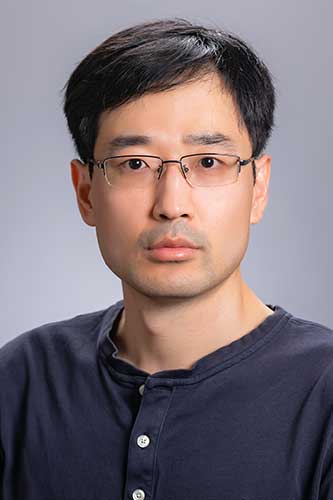Baocheng Geng
 Assistant Professor
Assistant Professor4147 University Hall
(205) 934-1297
Research and teaching interests: Human decision making, distributed detection and information fusion, optimization for signal processing and machine learning, internet of things.
Office hours: By appointment
Education:
- Ph.D., Syracuse University, Electrical and Computer Engineering
- B.S., Shanghai Jiao Tong University, Electrical and Computer Engineering
I am currently an Assistant Professor in the Department of Computer Science, The University of Alabama at Birmingham (UAB). Prior to joining UAB, I was a member of the Sensor Fusion Lab headed by Professor Pramod K. Varshney at Syracuse University. I work on the broad ranges of statistical signal processing and machine learning. My current research is focused on decision making in human and machine inference networks (HMIN). We aim to illustrate the fundamental concerns such as uncertainties, cognitive biases in human decision making and to reveal the significant differences between decision fusion involving human participants and information fusion with only physics-based sensors. These efforts advocate the strategic interdisciplinary activities: artificial intelligence, autonomous systems, behavioral psychology, and the human-technology frontier.
-
Research Interests
My primary research focus is to develop an interactive human-machine symbiosis where humans and machines simultaneously work within the same modeling environment to understand and solve problems. Such a symbiosis is expected to achieve higher performance than either humans or machines by themselves.
- For machines to better understand humans: cognitive models for decision making, mental state sensing, emotion detection, and behavioral informatics
- For humans to better understand machines: interpretable machine learning, explainable AI, shared situation awareness
My research topics also include crowdsourcing, internet of things (IoT), incentive mechanism design, optimization for signal processing and machine learning. Combining these research directions, the goal is to develop novel theoretical frameworks for collaborative decision making in distributed systems composed of both humans and machines, where the best of human is merged with the best of machine.
-
Recent Courses
- CS 203: Object-Oriented Programming
- CS355/555: Probability and Statistics in Computer Science
- CS665/675: Deep Learning
-
Select Publications
- B. Geng, Q. Li, and P. K. Varshney, “Utility Theory Based Optimal Resource Consumption for Inference in IoT Systems," IEEE Internet of Things (IoT) Journal, 2021.
- B. Geng, X. Cheng, S. Brahma, D. Kellen and P. K. Varshney, “Collaborative Human Decision Making with Heterogeneous Agents," IEEE Transactions on Computational Social Systems, 2021.
- B. Geng, S. Brahma, T, Wimalajeewa, P. K. Varshney, and M. Rangaswamy, “Prospect Theoretic Utility Based Human Decision Making in Multi-agent Systems," IEEE Transactions on Signal Processing, 2020.
- B. Geng, Q. Li, and P. K. Varshney, “Prospect Theory based Crowdsourcing for Classification in the Presence of Spammers," IEEE Transactions on Signal Processing, 2020
- B. Geng, C. Quan and P. K. Varshney, “Cognitive Memory Constrained Human Decision Making based on Multisource Information," IEEE International Conference on Acoustics, Speech and Signal Processing (ICASSP), 2021.
- N. Sriranga, B. Geng and P. K. Varshney, “On Human Assisted Decision Making for Machines Using Correlated Observations," 54th Asilomar Conference on Signals, Systems, and Computers (Asilomar), 2020. (Student paper contest finalist.)
- S. Zhang, B. Geng, P. K. Varshney, and M. Rangaswamy, “Fusion of Deep Neural Networks for Activity Recognition: A Regular Vine Copula-based Approach," 22nd International Conference on Information Fusion (FUSION), 2019.